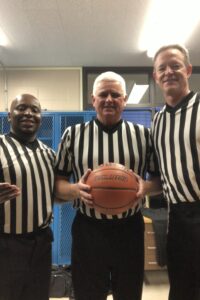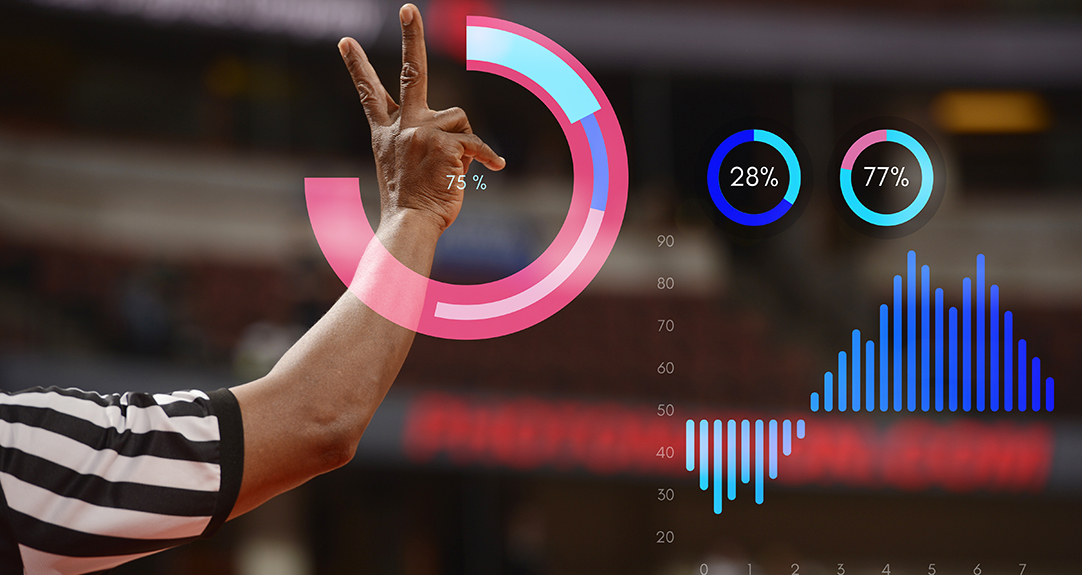Hardcourt Lessons
How officiating made me a better product leader
May 2023High school basketball season in Indiana just wrapped up in March, so it’s time for me to unwind before starting up again in November. When people learn that I officiate, the most frequently asked question is, “Why would you volunteer to get yelled at by coaches and fans!?” Well, I’m certainly not in it for the money. Ask any high school official or coach to convert their pay into an hourly wage, and you’ll wonder why we don’t just work drive-thru at Chick-Fil-A and save the hassle.

I do it because I love positively impacting people’s lives. High school sports are for the kids—and the kids can’t play without officials. Being a part of their experience is fulfilling, and managing a different dynamic—different coaches, players and schools—each game night is challenging and rewarding.
In my day job, I’ve worked as a product actuary for over 30 years, where a great deal of my role is working with insurance producers and agents. As a result, I’ve experienced the peaks and valleys of product rollouts and communicating price changes. For the last decade, as I navigated being a product actuary by day and a basketball official by night, I’ve recognized a surprisingly similar skill set required to succeed in both roles.
First quarter—build trust with your team
There are three officials in any given game— one referee and two umpires. The key to any well-officiated basketball game is a trio of officials that understand trust, partnership and collaboration.
Every game starts with an officials’ pregame meeting in the locker room. Even if you are working with a regular crew, the pregame meeting is still critical. We compare notes about the teams that will be playing to be prepared for the type of game it may be; we discuss what we know about the coaches, gym environment and anything else that can impact the game; we confirm how we’ll handle special situations —like a double whistle (two officials making a call simultaneously), a “blarge” (a call that could be a block or a charge), or press coverage. It gets us focused on the game.
This sets the stage for the game, starting from the moment we step onto the court for warm-ups. Constant communication is critical. Eye contact and nonverbal cues occur on every play—covering rotations, action around the rim, handling of coaches, and other nuances on the court.
As an official, you must believe you don’t need to watch the ball outside your primary coverage area because your partner will be watching it. You must believe that when your partner makes a call, they have a clear view of the play. You must get positioned to make a call, knowing that your partners will adjust to your move. We work as one unit with three individual parts.
For pricing teams or any leadership team, these same principles apply. Preparation is critical. Even with mature teams, it’s critical to set expectations for meetings; it’s critical to pregame your big meetings to confirm roles and discuss potential directions it could take and relevant recent events.
During the “game,” working collaboratively allows you to show up as a team, as a unit and as a well-prepared and committed operation. Eye contact and nonverbal cues happen in any successful business setting, and it’s easy for any observer to see a team that is unified versus a team that is not.
Lastly, trust matters. Nobody can make every call on the court, and nobody can cover every question about a business. So, believe in your teammates and be there for them when they show their belief in you.
Second quarter—communication is key
When you officiate sports, you work with various coaches—young and old, experienced and new, loud and subtle, arrogant and humble. They all deserve respect, as they are committing a huge amount of their time to help players. Likewise, field agents also run the gamut of age, experience, attitude and knowledge of the insurance world. And like coaches, agents deserve respect from the home office because their job is difficult, challenging and competitive. Both coaches and agents are driven by their passion for helping their players/clients.
The No. 1 lesson I’ve learned in working in both worlds is that communication is key.
I encounter a passionate counterparty in many interactions on both fronts. Coaches are emotional and adrenaline-driven and have an unmistakable drive to win. While capable of being rational, the heat of the moment can cause people to lose control of their emotions. As an official, however, it’s critical to recognize what drives this passion and do everything you can to keep the focus where it needs to be, which is on the game and the players. We do that by listening to a coach’s rant, explaining our perspective or clarifying a rule—strengthening the official-coach relationship.
These same principles apply to a product actuary. Our field partners are similarly emotional, adrenaline-filled, and have a drive to win. We need to recognize that and maintain our focus on the core issue and the impact on their clients. Like officials, we should lead by listening, considering their perspectives and keeping our composure while working through the problem. Regardless of the issue, learning to handle various personalities will defuse tough situations and invariably lead to outcomes that both sides find productive.
The official/coach relationship is sometimes volatile, but the best ones are shaped by mutual respect and understanding. That same relationship exists between the product actuaries and field agents with the same critical foundations. Focusing on building relationships will lead to desirable outcomes for everyone.
Without question, there will be some heated moments and questionable calls, and your ability to manage the game will be based on those key plays. However, handling those tough times well will lead to amazing relationships whether or not the “game” is on the line.
Third quarter—get ready for big moments
Google the largest high school gyms in the United States. Seriously, Google it. I’ll wait.
Did you do it? If not, I’ll give you a glimpse of what you would see. Eight of the 10 largest high school basketball gyms are in my home state, Indiana. And believe me when I tell you the fans at those sites love the game and show up ready to support their team. So, if you get the call to work at one of those sites, you’d better be ready for an amazing atmosphere of music, bands, cheerleaders and passionate fans.
As a pricing actuary, I’ve sometimes had that same feeling when asked to speak to a group from the field, for example, when doing a new product rollout. It’s a big setting (for an actuary!), and the “fans” are passionate and engaged. They’ve seen many games, and they can create an amazing atmosphere.
The key to success? Preparation. It’s relishing those big moments and having the confidence that you are, indeed, ready.
Officials will prepare for the season in a variety of ways. We’ll review the rule book, even though we’ve read it dozens of times. We’ll review the video of tough calls. We’ll engage our peers in discussions about tough situations. We’ll even stand in front of a mirror and make “calls” to see if our mechanics are strong.
That same preparation is necessary when standing in front of the room. It’s been my experience that most of my actuarial brethren are at least mildly uncomfortable, if not downright mortified, of standing in front of the field. But to steal a phrase from a former colleague, “Perfect preparation prepares for peak performance.” We not only need to master our topic, but more importantly, we need to engage with our field leadership peers as part of our pre-work. Understanding the “tough plays” that the field encounters and reviewing “video” (cases) will help with perspective. And yes, you should consider the ridiculousness of standing in front of your bathroom mirror and giving your talk to yourself. Finally, of course, you’ll want to make sure your mechanics are strong!
Fourth quarter—fulfilling your purpose
The question of why anyone would want to officiate high school basketball is not unlike the question that product actuaries get from their corporate peers: “Why would you voluntarily get yelled at by agents!?” Even if the yelling isn’t literal—the product actuary should want firsthand feedback from the field, regardless of how it’s given. Why do it? Similar to officiating basketball, it’s about fulfilling a purpose. In this case, it’s about helping agents deliver valuable solutions to their clients and impacting the lives of their loved ones. That’s what product actuaries do.
As actuaries, finding “purpose” in making a difference in people’s lives is sometimes difficult. Undoubtedly, all actuarial roles do that—some just directly impact policyholders more than others. Valuation actuaries, risk actuaries and data professionals all help companies stay strong, persist through difficult economic times and ensure we are there to fulfill our promises. I saw product work as the way to get as close to our policyholders as possible. The ability to work with field partners to deliver solutions was a way for me to wake up in the morning with a sense of purpose.
There are so many ways to impact the lives of those around us. I applaud anyone serving on community boards, volunteering or committing time to causes they believe in. For my wife, it’s been helping cats and teaching yoga. Each of us must find that “thing” that motivates us to help others.
For me, I found motivation by officiating and by being a product actuary. In my experience, both are mostly thankless jobs—you mostly get noticed when you do something wrong and only on rare occasions do you receive thanks from those you are trying to help. Neither is easy. Neither is glamorous. But both are necessary to ensure that the “game” goes on and lives continue to be shaped by what happens daily on the court and in the field.
Statements of fact and opinions expressed herein are those of the individual authors and are not necessarily those of the Society of Actuaries or the respective authors’ employers.
Copyright © 2023 by the Society of Actuaries, Chicago, Illinois.

